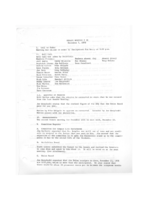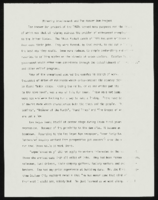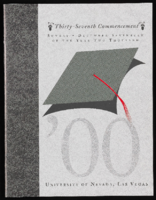Search the Special Collections and Archives Portal
Search Results

Transcript of interview with Dale Duane Everett by John Everett, March 7, 1980
Date
Archival Collection
Description
On March 7, 1980, John Everett interviewed his father, cab driver Dale Everett (born January 29, 1924 in Danville, Illinois) at their family home in Las Vegas, Nevada. This interview covers past local historical data. During the interview, Mr. Everett discusses the weather, wildlife, and hunting. He also shares his views on prostitution and gambling in Las Vegas.
Text

Benilda Long Somes oral history interview: transcript
Date
Archival Collection
Description
Oral history interview with Benilda Long Somes conducted by Vincent Long on November 29, 2021 for Reflections: The Las Vegas Asian American and Pacific Islander Oral History Project. Benilda discusses her life in Magalang, Philippines and her immigration to Saipan, part of the Northern Mariana Islands, as a young woman. She talks about meeting her partner, airman Robert Long, the birth of their son, and Robert's untimely death in an air crash less than a year later. Benilda shares how she and her child immigrated to the United States to be with family and their move to Las Vegas, Nevada in 2009.
Text

Meeting minutes for Consolidated Student Senate, University of Nevada, Las Vegas, December 7, 1976
Date
Archival Collection
Description
Text

"Minority Involvement and the Hoover Dam Project": manuscript draft by Roosevelt Fitzgerald
Date
Archival Collection
Description
From the Roosevelt Fitzgerald Professional Papers (MS-01082) -- Unpublished manuscripts file.
Text
Las Vegas Age
Alternate Title
Description
The Las Vegas Age was not Las Vegas's first newspaper; that distinction belongs to the short-lived Las Vegas Times which started publishing on March 25, 1905. But only two weeks later, on April 7, C.W. Nicklin founded what was the not-yet-a-city's third paper, the Age. Nicklin edited and published the Age from the Overland Hotel each Saturday as a six-page independent weekly, at $2 per year. When the railroad finally arrived, and laid out and auctioned off the town lots, the Age and its two competitors, the Times and the Advance, boomed with the new town amid lively journalistic debate. The Age briefly triumphed when the Times and Advance collapsed, until new competition arrived, and Nicklin left the Age to his partner Charles C. Corkhill to give his attention to his other paper, the Beatty Bullfrog Miner. Corkhill struggled for two years as editor and publisher, as Las Vegas languished in post-boom depression, then persuaded local businessman Charles P. "Pop" Squires to buy the paper, only after repeatedly dropping the price. Thus began the long and fruitful newspaper career of Charles Squires, sole editor and proprietor of the Age for almost forty years. Even after he sold the paper in 1943, he continued as editor until its last owner, Frank Garside of the Review-Journal, suspended publication of the Age on November 30, 1947.
As the Las Vegas Age, under Squires' shrewd editorship, dominated its local competition as the leading local newspaper with the largest circulation, it also became the leading paper in Southern Nevada. When Las Vegas was founded it was a remote railroad establishment far from the seat of Lincoln County, in Pioche where the county's leading newspaper and the paper of legal record was the Lincoln County Record, which had been in business since 1871. With the rapid growth of Las Vegas and the decline of the Pioche mining district, the population of southern Nevada shifted to the south and the divisions between the southern and northern sections of Lincoln County, which covered the whole of southeastern Nevada, became politically heated. When the Age began publication in Las Vegas in 1905, with a larger circulation than the Record in Pioche, the county commissioners decided to award to the Age all county printing and job work. The editor of the Record, not surprisingly, was enraged and commenced a series of personal attacks on the Age and the residents of Las Vegas, likening the Age to a mushroom fungi of uncertain life, possessing a readership of "floaters, the shiftless and reckless class."
Squires became the city's foremost booster and the Age became his trumpet, fighting for the division of Lincoln County that created Clark County, or for the new dam (an original member of Nevada's Colorado River Commission, Squires was in charge of publicity), or promoting as a one-man Chamber of Commerce civic and community organizations and projects or the city's nascent tourism and resort industry. Thus, the Age became the Voice of Las Vegas, as well as the most respected "paper of record" for the city. Other newspapers came and went, some were political adversaries (Squires was a staunch conservative, pro-business Republican), and some became well-established. But the Age remained the essential Las Vegas newspaper, from its fiercely independent editorials, to its boosterism and its comprehensive reporting of the simple everyday doings of this boisterous and dynamic new city.
See full information about this title online through Nevada's participation in the National Digital Newspaper Project. All issues digitized online at: Chronicling America collection from the Library of Congress.
1932
May
- Las Vegas Age, Vol. 28, No. 105 (1932-05-01)
- Las Vegas Age, Vol. 28, No. 106 (1932-05-03)
- Las Vegas Age, Vol. 28, No. 107 (1932-05-04)
- Las Vegas Age, Vol. 28, No. 108 (1932-05-05)
- Las Vegas Age, Vol. 28, No. 109 (1932-05-06)
- Las Vegas Age, Vol. 28, No. 110 (1932-05-07)
- Las Vegas Age, Vol. 28, No. 111 (1932-05-08)
- Las Vegas Age, Vol. 28, No. 113 (1932-05-10)
- Las Vegas Age, Vol. 28, No. 114 (1932-05-11)
- Las Vegas Age, Vol. 28, No. 115 (1932-05-12)
- Las Vegas Age, Vol. 28, No. 116 (1932-05-13)
- Las Vegas Age, Vol. 28, No. 117 (1932-05-14)
- Las Vegas Age, Vol. 28, No. 118 (1932-05-15)
- Las Vegas Age, Vol. 28, No. 119 (1932-05-17)
- Las Vegas Age, Vol. 28, No. 120 (1932-05-18)
- Las Vegas Age, Vol. 28, No. 121 (1932-05-19)
- Las Vegas Age, Vol. 28, No. 122 (1932-05-20)
- Las Vegas Age, Vol. 28, No. 123 (1932-05-21)
- Las Vegas Age, Vol. 28, No. 124 (1932-05-22)
- Las Vegas Age, Vol. 28, No. 125 BOULDER CITY AGE (1932-05-24)
- Las Vegas Age, Vol. 28, No. 126 (1932-05-25)
- Las Vegas Age, Vol. 28, No. 127 (1932-05-26)
- Las Vegas Age, Vol. 28, No. 128 (1932-05-27)
- Las Vegas Age, Vol. 28, No. 129 (1932-05-28)
- Las Vegas Age, Vol. 28, No. 130 (1932-05-29)
- Las Vegas Age, Vol. 28, No. 131 (1932-05-31)
June
- Las Vegas Age, Vol. 28, No. 132 (1932-06-01)
- Las Vegas Age, Vol. 28, No. 133 (1932-06-02)
- Las Vegas Age, Vol. 28, No. 134 (1932-06-03)
- Las Vegas Age, Vol. 28, No. 135 (1932-06-04)
- Las Vegas Age, Vol. 28, No. 136 (1932-06-05)
- Las Vegas Age, Vol. 28, No. 137 (1932-06-07)
- Las Vegas Age, Vol. 28, No. 138 (1932-06-08)
- Las Vegas Age, Vol. 28, No. 139 (1932-06-09)
- Las Vegas Age, Vol. 28, No. 140 (1932-06-10)
- Las Vegas Age, Vol. 28, No. 141 (1932-06-11)
- Las Vegas Age, Vol. 28, No. 142 (1932-06-12)
- Las Vegas Age, Vol. 28, No. 143 (1932-06-14)
- Las Vegas Age, Vol. 28, No. 144 (1932-06-15)
- Las Vegas Age, Vol. 28, No. 145 (1932-06-16)
- Las Vegas Age, Vol. 28, No. 146 (1932-06-17)
- Las Vegas Age, Vol. 28, No. 147 (1932-06-18)
- Las Vegas Age, Vol. 28, No. 148 (1932-06-19)
- Las Vegas Age, Vol. XXVIII, No. 149 (1932-06-21)
- Las Vegas Age, Vol. XXVIII, No. 150 (1932-06-22)
- Las Vegas Age, Vol. 28, No. 151 (1932-06-23)
- Las Vegas Age, Vol. 28, No. 152 (1932-06-24)
- Las Vegas Age, Vol. 28, No. 153 (1932-06-25)
- Las Vegas Age, Vol. 28, No. 154 (1932-06-26)
- Las Vegas Age, Vol. 28, No. 155 (1932-06-28)
- Las Vegas Age, Vol. 28, No. 156 (1932-06-29)
- Las Vegas Age, Vol. 28, No. 157 (1932-06-30)
July
- Las Vegas Age, Vol. XXVIII, No. 158 (1932-07-01)
- Las Vegas Age, Vol. XXVIII, No. 159 (1932-07-02)
- Las Vegas Age, Vol. XXVIII, No. 160 (1932-07-03)
- Las Vegas Age, Vol. XXVIII, No. 161 (1932-07-06)
- Las Vegas Age, Vol. XXVIII, No. 162 (1932-07-07)
- Las Vegas Age, Vol. XXVIII, No. 163 (1932-07-08)
- Las Vegas Age, Vol. XXVIII, No. 164 (1932-07-09)
- Las Vegas Age, Vol. XXVIII, No. 165 (1932-07-10)
- Las Vegas Age, Vol. XXVIII, No. 166 (1932-07-12)
- Las Vegas Age, Vol. XXVIII, No. 167 (1932-07-13)
- Las Vegas Age, Vol. XXVIII, No. 168 (1932-07-14)
- Las Vegas Age, Vol. XXVIII, No. 169 (1932-07-15)
- Las Vegas Age, Vol. XXVIII, No. 170 (1932-07-16)
- Las Vegas Age, Vol. XXVIII, No. 171 (1932-07-17)
- Las Vegas Age, Vol. XXVIII, No. 172 (1932-07-19)
- Las Vegas Age, Vol. XXVIII, No. 173 (1932-07-20)
- Las Vegas Age, Vol. XXVIII, No. 174 (1932-07-21)
- Las Vegas Age, Vol. XXVIII, No. 175 (1932-07-22)
- Las Vegas Age, Vol. XXVIII, No. 176 (1932-07-23)
- Las Vegas Age, Vol. XXVIII, No. 177 (1932-07-24)
- Las Vegas Age, Vol. XXVIII, No. 178 (1932-07-26)
- Las Vegas Age, Vol. XXVIII, No. 179 (1932-07-27)
- Las Vegas Age, Vol. XXVIII, No. 180 (1932-07-28)
- Las Vegas Age, Vol. XXVIII, No. 181 (1932-07-29)
- Las Vegas Age, Vol. XXVIII, No. 182 (1932-07-30)
- Las Vegas Age, Vol. XXVIII, No. 183 (1932-07-31)
August
- Las Vegas Age, Vol. XXVIII, No. 184 (1932-08-02)
- Las Vegas Age, Vol. XXVIII, No. 185 (1932-08-03)
- Las Vegas Age, Vol. XXVIII, No. 186 (1932-08-04)
- Las Vegas Age, Vol. XXVIII, No. 187 (1932-08-05)
- Las Vegas Age, Vol. XXVIII, No. 188 (1932-08-06)
- Las Vegas Age, Vol. XXVIII, No. 189 (1932-08-07)
- Las Vegas Age, Vol. XXVIII, No. 190 (1932-08-09)
- Las Vegas Age, Vol. XXVIII, No. 191 (1932-08-10)
- Las Vegas Age, Vol. XXVIII, No. 192 (1932-08-11)
- Las Vegas Age, Vol. XXVIII, No. 193 (1932-08-12)
- Las Vegas Age, Vol. XXVIII, No. 194 (1932-08-13)
- Las Vegas Age, Vol. XXVIII, No. 195 (1932-08-14)
- Las Vegas Age, Vol. XXVIII, No. 196 (1932-08-16)
- Las Vegas Age, Vol. XXVIII, No. 197 (1932-08-17)
- Las Vegas Age, Vol. XXVIII, No. 198 (1932-08-18)
- Las Vegas Age, Vol. XXVIII, No. 199 (1932-08-19)
- Las Vegas Age, Vol. XXVIII, No. 200 (1932-08-20)
- Las Vegas Age, Vol. XXVIII, No. 201 (1932-08-21)
- Las Vegas Age, Vol. XXVIII, No. 202 (1932-08-23)
- Las Vegas Age, Vol. XXVIII, No. 203 (1932-08-24)
- Las Vegas Age, Vol. XXVIII, No. 204 (1932-08-25)
- Las Vegas Age, Vol. XXVIII, No. 205 (1932-08-26)
- Las Vegas Age, Vol. XXVIII, No. 206 (1932-08-27)
- Las Vegas Age, Vol. XXVIII, No. 207 (1932-08-28)
- Las Vegas Age, Vol. XXVIII, No. 208 (1932-08-30)
- Las Vegas Age, Vol. XXVIII, No. 209 (1932-08-31)
September
- Las Vegas Age, Vol. XXVIII, No. 210 (1932-09-01)
- Las Vegas Age, Vol. XXVIII, No. 211 (1932-09-02)
- Las Vegas Age, Vol. XXVIII, No. 212 (1932-09-03)
- Las Vegas Age, Vol. XXVIII, No. 213 (1932-09-04)
- Las Vegas Age, Vol. XXVIII, No. 214 (1932-09-06)
- Las Vegas Age, Vol. XXVIII, No. 215 (1932-09-07)
- Las Vegas Age, Vol. XXVIII, No. 216 (1932-09-08)
- Las Vegas Age, Vol. XXVIII, No. 217 (1932-09-09)
- Las Vegas Age, Vol. XXVIII, No. 218 (1932-09-10)
- Las Vegas Age, Vol. XXVIII, No. 219 (1932-09-11)
- Las Vegas Age, Vol. XXVIII, No. 220 (1932-09-13)
- Las Vegas Age, Vol. XXVIII, No. 221 (1932-09-14)
- Las Vegas Age, Vol. XXVIII, No. 222 (1932-09-15)
- Las Vegas Age, Vol. XXVIII, No. 223 (1932-09-16)
- Las Vegas Age, Vol. XXVIII, No. 224 (1932-09-17)
- Las Vegas Age, Vol. XXVIII, No. 225 (1932-09-18)
- Las Vegas Age, Vol. XXVIII, No. 226 (1932-09-20)
- Las Vegas Age, Vol. XXVIII, No. 227 (1932-09-21)
- Las Vegas Age, Vol. XXVIII, No. 228 (1932-09-22)
- Las Vegas Age, Vol. XXVIII, No. 229 (1932-09-23)
- Las Vegas Age, Vol. XXVIII, No. 230 (1932-09-24)
- Las Vegas Age, Vol. XXVIII, No. 231 (1932-09-25)
- Las Vegas Age, Vol. XXVIII, No. 232 (1932-09-27)
- Las Vegas Age, Vol. XXVIII, No. 233 (1932-09-28)
- Las Vegas Age, Vol. XXVIII, No. 234 (1932-09-29)
- Las Vegas Age, Vol. XXVIII, No. 235 (1932-09-30)
October
- Las Vegas Age, Vol. XXVIII, No. 236 (1932-10-01)
- Las Vegas Age, Vol. XXVIII, No. 237 (1932-10-02)
- Las Vegas Age, Vol. XXVIII, No. 238 (1932-10-04)
- Las Vegas Age, Vol. XXVIII, No. 239 (1932-10-05)
- Las Vegas Age, Vol. XXVIII, No. 240 (1932-10-06)
- Las Vegas Age, Vol. XXVIII, No. 241 (1932-10-07)
- Las Vegas Age, Vol. XXVIII, No. 242 (1932-10-08)
- Las Vegas Age, Vol. XXVIII, No. 243 (1932-10-09)
- Las Vegas Age, Vol. XXVIII, No. 244 (1932-10-11)
- Las Vegas Age, Vol. XXVIII, No. 245 (1932-10-12)
- Las Vegas Age, Vol. XXVIII, No. 246 (1932-10-13)
- Las Vegas Age, Vol. XXVIII, No. 247 (1932-10-14)
- Las Vegas Age, Vol. XXVIII, No. 248 (1932-10-15)
- Las Vegas Age, Vol. XXVIII, No. 249 (1932-10-16)
- Las Vegas Age, Vol. XXVIII, No. 250 (1932-10-18)
- Las Vegas Age, Vol. XXVIII, No. 251 (1932-10-19)
- Las Vegas Age, Vol. XXVIII, No. 252 (1932-10-20)
- Las Vegas Age, Vol. XXVIII, No. 253 (1932-10-21)
- Las Vegas Age, Vol. XXVIII, No. 254 (1932-10-22)
- Las Vegas Age, Vol. XXVIII, No. 255 (1932-10-23)
- Las Vegas Age, Vol. 28, No. 256 (1932-10-25)
- Las Vegas Age, Vol. XXVIII, No. 257 (1932-10-26)
- Las Vegas Age, Vol. XXVIII, No. 258 (1932-10-27)
- Las Vegas Age, Vol. XXVIII, No. 259 (1932-10-28)
- Las Vegas Age, Vol. XXVIII, No. 260 (1932-10-29)
- Las Vegas Age, Vol. XXVIII, No. 261 (1932-10-30)
November
- Las Vegas Age, Vol. XXVIII, No. 262 (1932-11-01)
- Las Vegas Age, Vol. XXVIII, No. 263 (1932-11-02)
- Las Vegas Age, Vol. XXVIII, No. 264 (1932-11-03)
- Las Vegas Age, Vol. XXVIII, No. 265 (1932-11-04)
- Las Vegas Age, Vol. XXVIII, No. 266 (1932-11-05)
- Las Vegas Age, Vol. XXVIII, No. 267 (1932-11-06)
- Las Vegas Age, Vol. XXVIII, No. 268 (1932-11-08)
- Las Vegas Age, Vol. XXVIII, No. 269 (1932-11-09)
- Las Vegas Age, Vol. XXVIII, No. 270 (1932-11-10)
- Las Vegas Age, Vol. XXVIII, No. 271 (1932-11-11)
- Las Vegas Age, Vol. XXVIII, No. 272 (1932-11-12)
- Las Vegas Age, Vol. XXVIII, No. 273 (1932-11-13)
- Las Vegas Age, Vol. XXVIII, No. 274 (1932-11-15)
- Las Vegas Age, Vol. XXVIII, No. 275 (1932-11-16)
- Las Vegas Age, Vol. XXVIII, No. 276 (1932-11-17)
- Las Vegas Age, Vol. XXVIII, No. 277 (1932-11-18)
- Las Vegas Age, Vol. XXVIII, No. 278 (1932-11-19)
- Las Vegas Age, Vol. XXVIII, No. 279 (1932-11-20)
- Las Vegas Age, Vol. XXVIII, No. 271 (1932-11-22)
- Las Vegas Age, Vol. XXVIII, No. 272 (1932-11-23)
- Las Vegas Age, Vol. XXVIII, No. 282 (1932-11-24)
- Las Vegas Age, Vol. XXVIII, No. 283 (1932-11-26)
- Las Vegas Age, Vol. XXVIII, No. 284 (1932-11-27)
- Las Vegas Age, Vol. XXVIII, No. 285 (1932-11-29)
- Las Vegas Age, Vol. XXVIII, No. 286 (1932-11-30)
December
- Las Vegas Age, Vol. XXVIII, No. 287 (1932-12-01)
- Las Vegas Age, Vol. XXVIII, No. 288 (1932-12-02)
- Las Vegas Age, Vol. XXVIII, No. 289 (1932-12-03)
- Las Vegas Age, Vol. XXVIII, No. 290 (1932-12-04)
- Las Vegas Age, Vol. XXVIII, No. 291 (1932-12-06)
- Las Vegas Age, Vol. XXVIII, No. 292 (1932-12-07)
- Las Vegas Age, Vol. XXVIII, No. 293 (1932-12-08)
- Las Vegas Age, Vol. XXVIII, No. 294 (1932-12-09)
- Las Vegas Age, Vol. XXVIII, No. 295 (1932-12-10)
- Las Vegas Age, Vol. XXVIII, No. 296 (1932-12-11)
- Las Vegas Age, Vol. XXVIII, No. 297 (1932-12-13)
- Las Vegas Age, Vol. XXVIII, No. 298 (1932-12-14)
- Las Vegas Age, Vol. XXVIII, No. 299 (1932-12-15)
- Las Vegas Age, Vol. XXVIII, No. 300 (1932-12-16)
- Las Vegas Age, Vol. XXVIII, No. 301 (1932-12-17)
- Las Vegas Age, Vol. XXVIII, No. 302 (1932-12-18)
- Las Vegas Age, Vol. XXVIII, No. 303 (1932-12-20)
- Las Vegas Age, Vol. XXVIII, No. 303 (1932-12-21)
Language
English
Frequency
Place of Publication
Geographic Coverage
International Standard Serial Number (ISSN)
Library of Congress Control Number (lccn)
OCLC Number

University of Nevada, Las Vegas (UNLV) 37th commencement program
Date
Archival Collection
Description
Commencement program from University of Nevada, Las Vegas Commencement Programs and Graduation Lists (UA-00115).
Text

Rocio Rodríguez-Martinez oral history interview: transcript
Date
Archival Collection
Description
Oral history interview with Rocio Rodríguez-Martinez conducted by Elsa Lopez and Monserrath Hernández on June 21, 2019 for the Latinx Voices of Southern Nevada Oral History Project. Rocio shares her personal history growing up in Bogotá, Colombia and how she immigrated to the United States. She talks about motherhood, her Latina identity, and her experiences raising her daughter in Los Angeles and Las Vegas with her husband. Rocio also discusses her employment history and how she was able to achieve her professional goals of becoming a Spanish and English teacher for the Clark County School District (CCSD)'s Family and Community Engagement Services (FACES) program. Her interview is conducted in Spanish. Subjects discussed include: Bogotá, Colombia; El Salvador; Family and Community Engagement Services (FACES).
Text

Jessica Hutchings oral history interview: transcript
Date
Archival Collection
Description
Oral history interview with Jessica Hutchings conducted by Barbara Tabach on March 21, 2018 for the Remembering 1 October Oral History Project. In this interview, Jessica Hutchings discusses her experience flying to Las Vegas, Nevada on the night of the October 1, 2017 mass shooting. She speaks of her flight's detour to Phoenix, Arizona, and her discovery of the shooting. Hutchings explains how Congregation Ner Tamid, where she is a cantor, contributed to the community healing after the tragedy, including their organization of vigils, a music fundraiser called "Vegas Strong in Song," and discussing the event with teenage Hebrew School students who had questions and concerns about the shooting.
Text

Transcript of interview with Sandra Peña by Lada Mead and Stefani Evans, March 27, 2017
Date
Archival Collection
Description
Sandra Peña’s story begins in East Los Angeles, where she spent her first fifteen years with her parents (both from Michoacán, Mexico), and her younger sister. The father's managerial position at Master Products allowed the family to live rent-free in a company-owned house behind the main factory, because he collected the rents for the company's two other dwellings. In this interview, Peña recalls the family move to Porterville, in California's Central Valley, her return to Los Angeles at nineteen, and her work with Parson’s Dillingham, a contractor for the Metrolink rail system. She draws the link between the Los Angeles and Las Vegas construction communities by describing her husband's move to Las Vegas to find work; a chance Las Vegas encounter with a friend from Chino, California; her ability to gain employment in Las Vegas at Parson’s, a company that had joint ventured with Parson’s Dillingham, and her move from there to Richardson Construction, a local minority-owned company. As Peña says, "It's kind of all intermingled. Even if you go here and you go there, it's like everybody knows everybody." Throughout, Peña weaves her family story into the narrative as she describes her youth, the birth of her son, the illness and death of her father, and her family's participation in her current employment with Richardson. As she remembers the people, places, and events of her life, Peña speaks to the ways one woman of color built on her interstate construction connections and rose in a male-dominated industry.
Text
